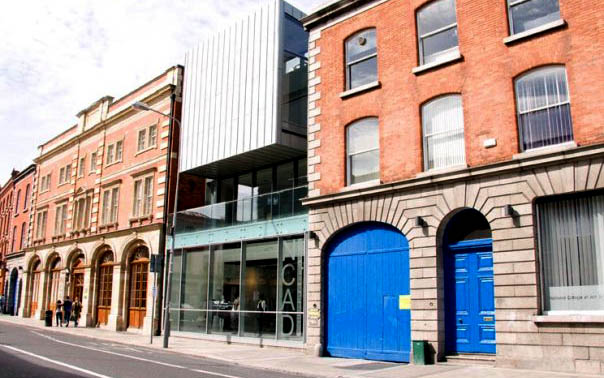
Hemp shirts. Mouldy charity store finds. Your sister’s hand-me-down school jumper. These are the garments that often spring to mind in response to the phrase “sustainable fashion”. The common consumer belief is that sustainable fashion is essentially anti-fashion. Choosing to be ethical, to many a Penneys-fanatic, means swapping style for morals. The more sustainable your wardrobe, the more likely you are to start wearing dirty white socks with beige sandals. Is this true? Or are there other ways to match ethics with your outfits?
The National College of Art and Design (NCAD) Gallery hosted a panel discussion entitled Sustainability In Design Education: Responding to the Task as Makers and Educators, to ask these very questions. On the panel, chaired by NCAD’s Hilary Kelly, were designers, entrepreneurs and activists Carrey Somers, Rosie Reilly and Kate Nolan. Interestingly, all three had pursued a PhD in other subjects before entering the fashion industry, had become immersed in the fashion world and then had had a moral epiphany. “So there’s your advice if you want to be an NCAD fashion panellist”, joked Kelly, “Drop out of your PhD.”
Global activist Carey Somers has certainly attempted to provide answers to the questions raised by sustainable fashion. At the discussion, she stressed a necessity for greater transparency between the three tiers of fashion production. The first tier relates to the assembly of the item itself, while tier two involves activities such as dyeing. Tier three, the almost utterly untraceable part of the process, refers to the preparation of the raw material. High street stores such Forever 21 and New Look rarely disclose where or by whom their clothes are made. Some, explained Somers, don’t even have access to the information themselves.
The journey a design takes from the designer to the store is one that is particularly unglamorous, and one that is often swept under the rug. In 2014, Somers founded the Fashion Revolution to urge companies to disclose the details of their factories to the public. She asks consumers not to wear hemp, but to simply ask: who made their clothes, and under what conditions?
Having had firsthand experience as a buyer located in the countries where fast fashion’s clothing is manufactured, Nolan described to the room how mistreated workers can be. Many workers in these factories are underpaid. Ridiculously, sometimes a mere 20 cent extra per garment would suffice to provide them with a minimum wage. However, a number of buyers for large fashion brands push factories to produce a set amount of items that exceeds their capabilities. Workers end up with a lower wage, and consumers end up with a cheaper price.
Nolan described a horrific practice which takes place in the third-tier cotton industry in India. Girls aged from 14 to 16 sign contracts binding them to remain within the doors of a factory for three-year periods. They are then released to their family with a single sum of money to be used as a dowry. They are essentially unpaid prisoners, captured by the consumer culture of the West that has taken advantage of the traditions of their native country.
So, what can the average consumer do? Is it necessary to boycott all brands that don’t fall under the sustainable fashion label? To Rosie Reilly, the answer is education. Simply opening conversation around that illusive, unmentioned third party involved in the fashion process motivates change. Ask: who made my clothes? Identify the anonymous woman in China who was just as involved in the creation of your garment as Gucci was in designing it and Vogue was in promoting it. Communicate with brands and demand information. The aim of the Fashion Revolution is to expose the middleman, and to slow down the wasteful, destructive pace of fast fashion. In the words of Nolan, “you are directly contributing to this system”: so the power is in the consumers’ collective hands.






